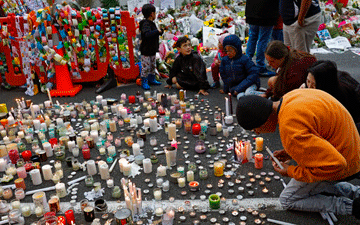
AP Photo/Vincent Yu
Anita Varma is the program manager for Journalism & Media Ethics as well as Business, Leadership, and Social Sector Ethics at the Markkula Center for Applied Ethics. Views are her own.
In the wake of the Christchurch shooting at the Al Noor Mosque and Linwood Islamic Center, digital platforms that disseminate news have struggled to contain and remove the video of the shooting, which the shooter originally shared through Facebook Live. Like a morbid game of whack-a-mole, platforms quickly tried to remove the content only to see it return through user uploads with minor modifications that aimed to evade automated checks. These posts were shared and reshared, and two British news outlets (The Mirror and The Daily Mail) posted the video, which they later pulled.
The question of how to deal with violent content – and whether to publicize it at all – is one that journalists have grappled with long before the advent of digital platforms. The Society of Professional Journalists Code of Ethics states, “Ethical journalism treats sources, subjects, colleagues and members of the public as human beings deserving of respect” (emphasis added). Put another way, journalists regularly pledge to uphold people’s dignity on the basis of intrinsic worth.
Derived not from an individual’s contributions or merit and instead based on inherent worthiness by virtue of being a person, dignity is a crucial ethical principle – and one that is often missing from discussions of digital news norms related to posting and resharing. Dignity should guide journalism as well as journalistic acts such as resharing news on platforms, and should shape content policies for what can and cannot be aired.
Publishing visuals of victims experiencing violence has long been a contested topic in journalistic circles. On the one hand, some have argued in past cases, restricting access to such content amounts to censorship and paternalism, wherein an obligation to truth is sacrificed for a more sanitized version of reality. Still worse, shielding people from horrific content may insulate them to the point of denial. Separately, others argue, if people are genuinely repulsed and recoil at the content, it will simply slip out of popularity and there will be no issue. The viewer is ultimately responsible for deciding what to view, one might conclude.
At the same time, nearly all sectors are regulated to protect a public good beyond encouraging good individual choices. Seat belts, cigarette warnings, removing sugary food from schools all came about to protect people’s well-being due to automobile accidents, lung disease, and rising juvenile diabetes. Leaving it to the individual (consumer) to decide for themselves surrenders the ethical question and reframes it as a matter of personal preference. Regulation, on the other hand, prioritizes people’s dignity beyond what a market logic free from ethical principles can provide.
Given the global reach of digital platforms that disseminate news content, these regulations need to be developed and instituted in a way that transcends national borders – to ensure dignity for all.
As people attempt to make sense of senseless killing, discussions quickly turn to assigning blame and attempting to come up with technical solutions. In such discussions, it is easy to lose sight of the stakes of human dignity and to submerge such considerations in false binaries about either having Internet platforms for news or not. Regulated platforms for news content sharing could, instead, create the kinds of spaces that founders claim to want: spaces where people can safely share and engage with one another, which are designed to respect people’s dignity and reject content that denigrates it.
The Christchurch shooting joins the ranks of far too many shootings to list here. From Columbine to Aurora to Parkland to Pittsburgh, discussions of how to ethically represent realities of terror and violence need to recenter questions of human dignity above and beyond rationalizations for technical limitations and excuses for audiences that reshare such content. Dignity as an ethical principle provides a starting point for us to find ways – together – to envision changes to how news is shared that might honor victims whose intrinsic worth endures.